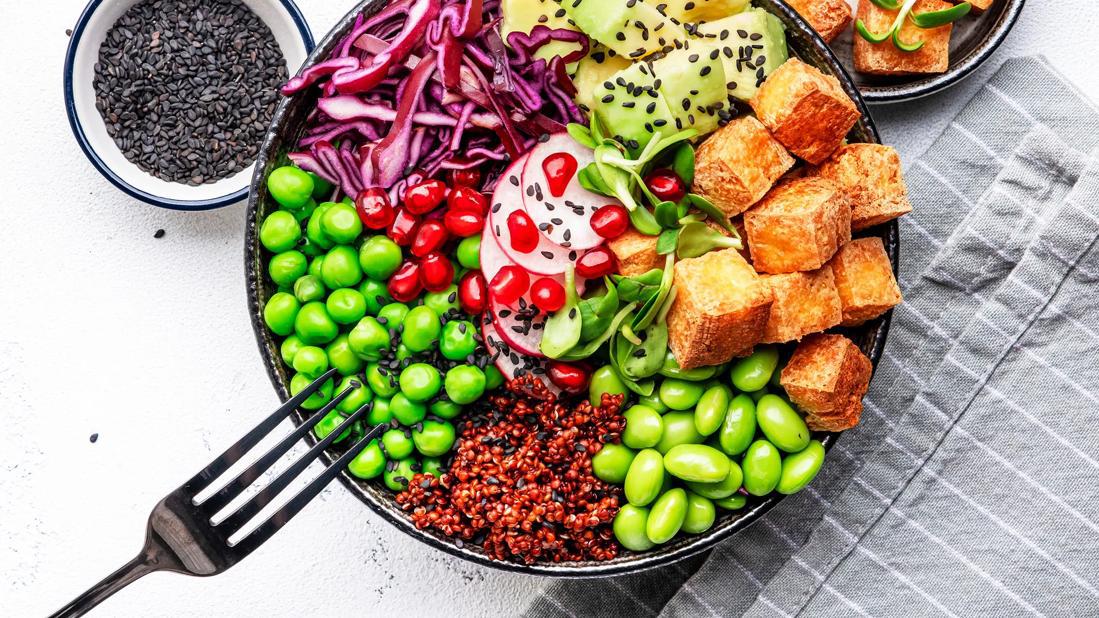Can Hot Flashes Be Managed Through Diet?
The choices you make at mealtime could reduce hot flashes or make them worse

What are you eating? If you’re entering menopause, the answer to that question may be a factor in whether you experience the fury of a hot flash.
Research shows that eating certain foods may help drastically reduce the frequency and burning intensity of hot flashes. As you might expect, too, various foods can dial up fiery discomfort.
So, what should and shouldn’t be on your plate to manage your temperature? Let’s set a menu with the help of women’s health specialist Lynn Pattimakiel, MD, and registered dietitian Julia Zumpano, RD, LD.
How can food help manage hot flashes?
The menopause transition can bring estrogen hormone fluctuations that fuel vasomotor symptoms like hot flashes. This burst of body heat can lead to sweating, flushed skin and other uncomfortable reactions.
What you eat can help calm or escalate the hormone swings that fuel hot flashes.
“There are dietary triggers that can lessen or worsen symptoms,” says Dr. Pattimakiel. “So, if you target those triggers ― maybe by adding some foods or eliminating others ― you may get a significant response.”
Foods to limit hot flashes
If you want an overall eating plan to cool off hot flashes, consider the Mediterranean diet. One study found that women who followed the diet were 20% less likely to experience hot flashes and night sweats.
The Mediterranean diet focuses on plant-based foods and healthier fats, says Zumpano. Overall, it’s often labeled as the gold standard for eating for good health.
If you’re not looking to switch up your diet entirely, try incorporating these foods into your meals.
Soy-based products
Soy contains certain plant compounds that appear to minimize the frequency and severity of hot flashes. A review of research found that soy may help reduce hot flashes by more than 25%.
These compounds (called isoflavones) are also phytoestrogens, which mimic biological estrogen and may help regulate hormonal levels, says Zumpano.
Soy-based products that may help with hot flashes include:
If you’re looking to boost your soy intake, Dr. Pattimakiel recommends sticking with food as opposed to trying a supplement. The reason? Supplements aren’t regulated, which can bring quality and safety concerns.
“More natural sources are always your better option,” she notes.
Other phytoestrogen-rich foods
Soy-based products aren’t the only pantry items with phytoestrogens. You can also find the beneficial compound in:
- Whole grains, such as oats, barley and wheat
- Seeds, like flaxseed and sesame seeds
- Legumes, such as lentils and many types of beans
- Various berries, including blackberries, blueberries and strawberries
Veggies
There are A LOT of good reasons to eat vegetables when it comes to your health. “I always say there’s nothing bad in the grocery store that comes from the ground,” shares Zumpano. “You can’t go wrong eating vegetables.”
Loading up on an A-to-Z list of veggies ranging from asparagus to zucchini can help you minimize weight gain during menopause, which can be another factor in hot flashes. (A study found that weight loss through diet modifications helped reduce hot flashes.)
Omega-3s
There’s some evidence that foods high in omega-3 fatty acids can provide some relief for hot flashes and night sweats. Foods high in this healthy fat include:
- Salmon, herring and other fish
- Flaxseeds (again!)
- Chia seeds
- Avocados
Cooling foods
Are some foods more chill than others? It seems so, as there are certain “cooling foods” that may turn down the temperature on hot flashes. The list includes:
Foods that can worsen hot flashes
Cutting certain foods from your diet can also be beneficial when it comes to easing hot flashes. Here are some items to consider taking off your grocery list.
Ultra-processed food
Eating ultra-processed food tends to heighten blood pressure, which can also fuel hot flashes. Zumpano recommends trying to limit items such as:
- Baked goods
- Sugary beverages
- Fast foods
- Fried foods
Caffeinated drinks
Hot flashes can make it difficult to get a good night’s sleep ― a reality that may make you more inclined to reach for extra cups of coffee or crack open a high-voltage energy drink to get through the day.
Unfortunately, the caffeine you’re leaning on to function can fuel more bothersome hot flashes that can make it even tougher to get restful ZZZs.
“It’s a vicious cycle,” says Dr. Pattimakiel. “You’re reaching for caffeine because you’re having disrupted sleep, but the caffeine can stimulate the hot flashes and night sweats that keep waking you up.”
If you’re looking for ways to limit caffeine intake, consider drinking green tea, chicory coffee or a few other coffee alternatives. (But be cautious: Hot beverages can also set off hot flashes, so maybe try an iced matcha or iced tea instead.)
Alcohol
You’re probably well aware that there’s no real health benefit to drinking alcohol, whether it’s a cold beer, a glass of wine or a trendy cocktail. It’s a toxin that’s just not ideal for your body or your mind.
Mixing alcohol with menopause can increase the frequency and intensity of hot flashes and night sweats, emphasizes Zumpano. That’s especially true if you have more than one drink a day.
So, if you’re going to drink, do so in moderation. You could always give increasingly popular nonalcoholic options a try, too.
Spicy foods
Heat brings heat, cautions Dr. Pattimakiel. “Spicy food is one of the things that can sometimes trigger hot flashes,” she says.
Final thoughts
What you’re eating may contribute to hot flashes ― but it might not be a factor either. Keeping track of what you ate before hot flashes may help you identify patterns and potential trigger foods.
Talk with a healthcare provider for recommendations before making drastic dietary changes to try to address hot flashes. They may also be able to suggest other strategies to manage hot flashes.